高中英语必修三第四单元知识点总结
高一必修三英语unit4知识点
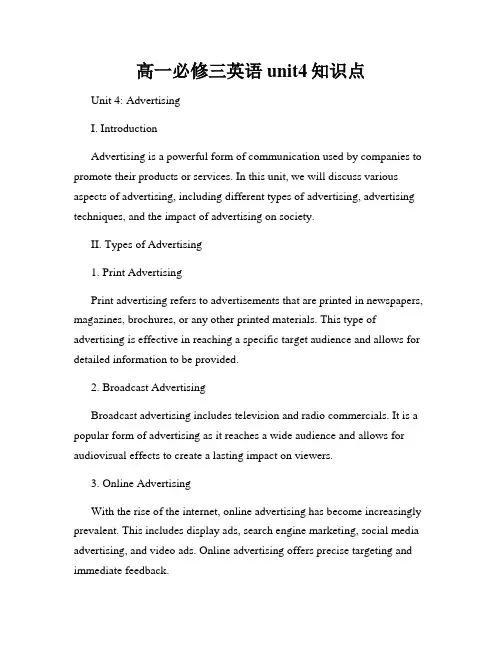
高一必修三英语unit4知识点Unit 4: AdvertisingI. IntroductionAdvertising is a powerful form of communication used by companies to promote their products or services. In this unit, we will discuss various aspects of advertising, including different types of advertising, advertising techniques, and the impact of advertising on society.II. Types of Advertising1. Print AdvertisingPrint advertising refers to advertisements that are printed in newspapers, magazines, brochures, or any other printed materials. This type of advertising is effective in reaching a specific target audience and allows for detailed information to be provided.2. Broadcast AdvertisingBroadcast advertising includes television and radio commercials. It is a popular form of advertising as it reaches a wide audience and allows for audiovisual effects to create a lasting impact on viewers.3. Online AdvertisingWith the rise of the internet, online advertising has become increasingly prevalent. This includes display ads, search engine marketing, social media advertising, and video ads. Online advertising offers precise targeting and immediate feedback.III. Advertising Techniques1. Emotional AppealMany advertisements aim to evoke emotions in order to connect with the audience. By creating an emotional connection, companies hope to establish a positive association with their brand or product.2. Celebrity EndorsementsCelebrity endorsements involve well-known individuals promoting a product or service. This technique leverages the popularity and influence of celebrities to gain the trust and attention of consumers.3. Bandwagon EffectThe bandwagon effect is based on the idea that people are more likely to adopt a certain behavior or purchase a product if they believe others are doing the same. Advertisements often use phrases such as "Join the trend" or "Be part of the crowd" to create a sense of conformity.4. TestimonialsTestimonials feature real or fictitious individuals who provide positive feedback or personal experiences with a product or service. This technique aims to build trust and credibility with potential customers.IV. Impact of Advertising on Society1. ConsumerismAdvertising plays a significant role in promoting consumerism, creating a desire for material possessions, and shaping the way people perceive theirneeds and wants. This can lead to excessive consumption and unnecessary spending.2. Body ImageAdvertisements often present unrealistic and idealized body images, which can contribute to body dissatisfaction and low self-esteem, especially among young people. This can have detrimental effects on mental health.3. Cultural InfluenceAdvertising has the power to shape cultural norms and values. It can influence societal attitudes towards gender, race, and other social constructs. Therefore, responsible advertising is crucial to avoid perpetuating harmful stereotypes.4. Economic ImpactAdvertising fuels economic growth by stimulating demand for products and services. It provides employment opportunities within the advertising industry and contributes to overall economic development.V. ConclusionIn conclusion, advertising is a multi-faceted field that encompasses various types and techniques. While advertising has its advantages in promoting products and services, it also has significant effects on society. As consumers, it is important to be critical of the messages conveyed through advertising and make informed decisions. Likewise, companies have a responsibility to create ethical and socially responsible advertisements.。
高一英语必修三unit4的知识点
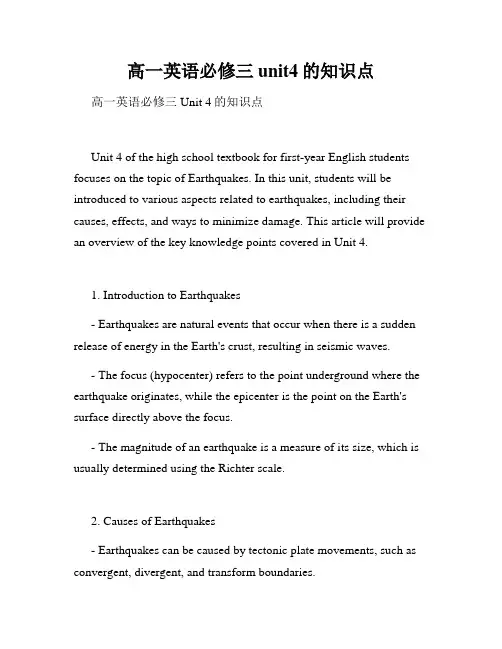
高一英语必修三unit4的知识点高一英语必修三Unit 4的知识点Unit 4 of the high school textbook for first-year English students focuses on the topic of Earthquakes. In this unit, students will be introduced to various aspects related to earthquakes, including their causes, effects, and ways to minimize damage. This article will provide an overview of the key knowledge points covered in Unit 4.1. Introduction to Earthquakes- Earthquakes are natural events that occur when there is a sudden release of energy in the Earth's crust, resulting in seismic waves.- The focus (hypocenter) refers to the point underground where the earthquake originates, while the epicenter is the point on the Earth's surface directly above the focus.- The magnitude of an earthquake is a measure of its size, which is usually determined using the Richter scale.2. Causes of Earthquakes- Earthquakes can be caused by tectonic plate movements, such as convergent, divergent, and transform boundaries.- Subduction zones, where one tectonic plate is forced beneath another, are particularly prone to producing powerful earthquakes.- Human activities, such as mining and the creation of reservoirs, can also trigger seismic events known as induced earthquakes.3. Effects of Earthquakes- Primary effects of earthquakes include ground shaking, surface ruptures, and tsunamis (ocean waves triggered by seismic activity).- Secondary effects may include landslides, fires, and the destruction of buildings and infrastructure.- Earthquakes can also lead to human casualties and displacement, as well as long-term economic and social consequences.4. Examining Earthquakes- Scientists use seismographs to measure seismic waves and record earthquake data.- The data collected allows them to determine the location, magnitude, and depth of an earthquake.- Earthquakes can be classified as foreshocks (smaller earthquakes preceding a larger one) and aftershocks (smaller earthquakes that follow the main shock).5. Earthquake Preparedness and Mitigation- Building codes and construction practices can help prevent or minimize damage caused by earthquakes.- Early warning systems can provide valuable seconds to minutes of advance notice, allowing people to take cover or evacuate.- Public education and awareness campaigns play a crucial role in ensuring communities are prepared for earthquakes.6. Case Studies- Unit 4 includes case studies on significant earthquakes from around the world, such as the 1906 San Francisco earthquake and the 2011 Tohoku earthquake and tsunami in Japan.- These case studies provide real-life examples of the causes, effects, and responses to earthquakes, offering students a deeper understanding of the topic.In conclusion, Unit 4 of the high school English textbook explores the topic of earthquakes. Through studying this unit, students will gain knowledge about earthquakes' causes, effects, examination methods, and ways to prepare and mitigate their impact. By understanding thesekey points, students will develop a greater awareness of earthquakes and their significance in our world.。
高中英语必修三 Unit 4 必背单词和词块
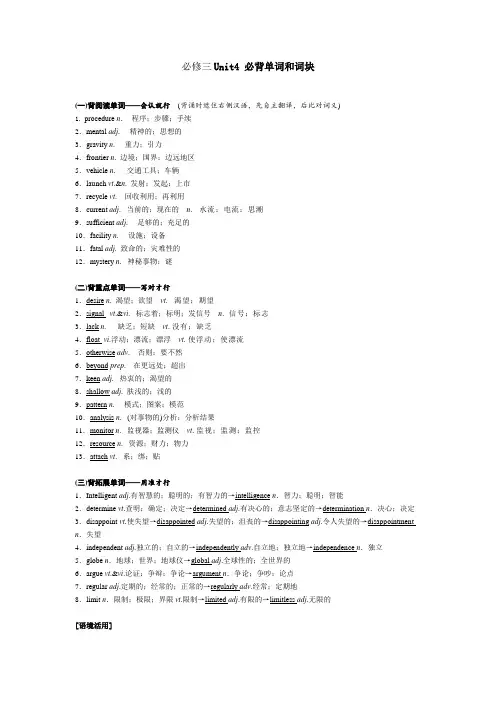
必修三Unit4 必背单词和词块(一)背阅读单词——会认就行(背诵时遮住右侧汉语,先自主翻译,后比对词义)1.procedure n.程序;步骤;手续2.mental adj. 精神的;思想的3.gravity n. 重力;引力4.frontier n. 边境;国界;边远地区5.vehicle n. 交通工具;车辆6.launch vt.&n. 发射;发起;上市7.recycle vt. 回收利用;再利用8.current adj. 当前的;现在的n. 水流;电流;思潮9.sufficient adj. 足够的;充足的10.facility n. 设施;设备11.fatal adj. 致命的;灾难性的12.mystery n. 神秘事物;谜(二)背重点单词——写对才行1.desire n. 渴望;欲望vt. 渴望;期望2.signal vt.&vi. 标志着;标明;发信号n. 信号;标志3.lack n. 缺乏;短缺vt. 没有;缺乏4.float vi.浮动;漂流;漂浮vt. 使浮动;使漂流5.otherwise adv. 否则;要不然6.beyond prep. 在更远处;超出7.keen adj. 热衷的;渴望的8.shallow adj. 肤浅的;浅的9.pattern n. 模式;图案;模范10.analysis n. (对事物的)分析;分析结果11.monitor n. 监视器;监测仪vt. 监视;监测;监控12.resource n. 资源;财力;物力13.attach vt. 系;绑;贴(三)背拓展单词——用准才行1.Intelligent adj.有智慧的;聪明的;有智力的→intelligence n.智力;聪明;智能2.determine vt.查明;确定;决定→determined adj.有决心的;意志坚定的→determination n.决心;决定3.disappoint vt.使失望→disappointed adj.失望的;沮丧的→disappointing adj.令人失望的→disappointment n.失望4.independent adj.独立的;自立的→independently adv.自立地;独立地→independence n.独立5.globe n.地球;世界;地球仪→global adj.全球性的;全世界的6.argue vt.&vi.论证;争辩;争论→argument n.争论;争吵;论点7.regular adj.定期的;经常的;正常的→regularly adv.经常;定期地8.limit n.限制;极限;界限vt.限制→limited adj.有限的→limitless adj.无限的[语境活用]1.Since the country became independent in 1842, it has played an important role independently.(independent) 2.A person's life is limited but knowledge is limitless.(limit)3.Artificial intelligence has been used in phones, which makes them seem to be intelligent.(intelligent)4.She is a determined girl, so we know that once she has determined to do something, she will make her dream come true with great determination.(determine)5.To my disappointment,_I saw a disappointed expression on his face due to his disappointing testscore.(disappoint)6.He argued against smoking, and insisted that it was beyond argument that smoking was harmful to health.At last, he argued us out of smoking.(argue)(四)背高频单词——先“记牢”再“用活”,不背绝对不行1.determine vt.查明;确定;决定2.disappointed adj.失望的;沮丧的渴望;欲望vt.渴望;期望3.desire n.4.lack n.缺乏;短缺vt.没有;缺乏5.argue vt.& vi.论证;争辩;争论(五)背短语词块——表达出彩,需多积词块才行单元短语再认再现1.carry on继续做,坚持干2.on board 在宇宙飞船上;在船(飞机)上3.in the hope of doing_sth. 抱着……的希望4.so as to (do sth.) 为了;以便5.figure out 弄懂;弄清楚;弄明白6.result in 导致;造成7.as a result 所以;结果(是)8.provide for sb. 提供生活所需9.in closing 最后10.run out 用完;耗尽重点短语拓展用活1.result in导致;造成2.run out用完;耗尽(六)背主题写作——好习作就靠“仿效”和“背诵”议论文:太空探索是否值得?【题目要求】最近,你班同学就“太空探索是否值得”这一话题展开了一场讨论。
河南省高中英语必修三Unit4SpaceExploration知识点总结(超全)
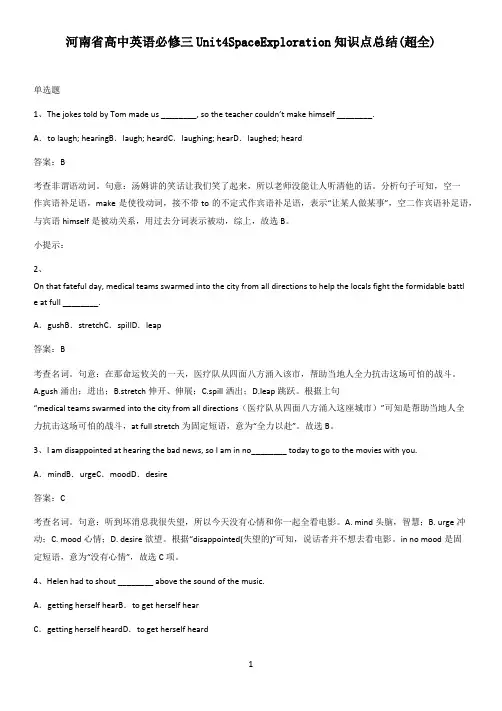
河南省高中英语必修三Unit4SpaceExploration知识点总结(超全)单选题1、The jokes told by Tom made us ________, so the teacher couldn’t make himself ________.A.to laugh; hearingB.laugh; heardC.laughing; hearD.laughed; heard答案:B考查非谓语动词。
句意:汤姆讲的笑话让我们笑了起来,所以老师没能让人听清他的话。
分析句子可知,空一作宾语补足语,make是使役动词,接不带to的不定式作宾语补足语,表示“让某人做某事”,空二作宾语补足语,与宾语himself是被动关系,用过去分词表示被动,综上,故选B。
小提示:2、On that fateful day, medical teams swarmed into the city from all directions to help the locals fight the formidable battle at full ________.A.gushB.stretchC.spillD.leap答案:B考查名词。
句意:在那命运攸关的一天,医疗队从四面八方涌入该市,帮助当地人全力抗击这场可怕的战斗。
A.gush涌出;迸出;B.stretch伸开、伸展;C.spill洒出;D.leap跳跃。
根据上句“medical teams swarmed into the city from all directions(医疗队从四面八方涌入这座城市)”可知是帮助当地人全力抗击这场可怕的战斗,at full stretch为固定短语,意为“全力以赴”。
故选B。
3、I am disappointed at hearing the bad news, so I am in no________ today to go to the movies with you. A.mindB.urgeC.moodD.desire答案:C考查名词。
人教版高一英语必修3UNIT4知识点总结
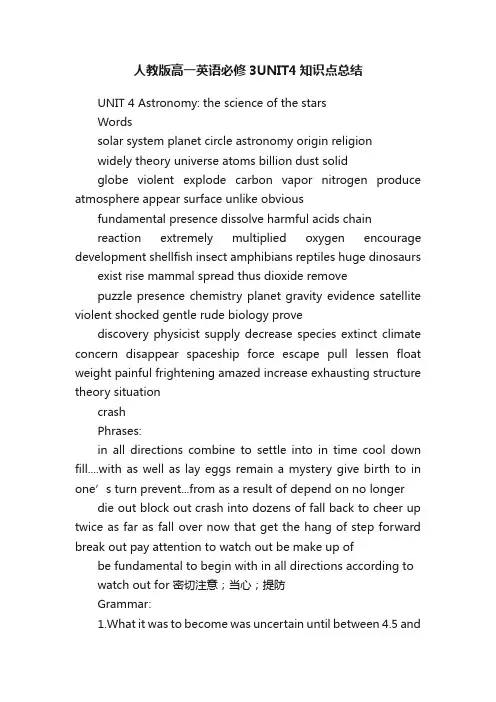
人教版高一英语必修3UNIT4知识点总结UNIT 4 Astronomy: the science of the starsWordssolar system planet circle astronomy origin religionwidely theory universe atoms billion dust solidglobe violent explode carbon vapor nitrogen produce atmosphere appear surface unlike obviousfundamental presence dissolve harmful acids chainreaction extremely multiplied oxygen encourage development shellfish insect amphibians reptiles huge dinosaurs exist rise mammal spread thus dioxide removepuzzle presence chemistry planet gravity evidence satellite violent shocked gentle rude biology provediscovery physicist supply decrease species extinct climate concern disappear spaceship force escape pull lessen float weight painful frightening amazed increase exhausting structure theory situationcrashPhrases:in all directions combine to settle into in time cool down fill....with as well as lay eggs remain a mystery give birth to in one’s turn prevent...from as a result of depend on no longer die out block out crash into dozens of fall back to cheer up twice as far as fall over now that get the hang of step forward break out pay attention to watch out be make up ofbe fundamental to begin with in all directions according to watch out for 密切注意;当心;提防Grammar:1.What it was to become was uncertain until between 4.5 and3.8 billion years ago when the dust settled into a solid. (随后)它变成什么没人知道,知道38~45亿年前,这团尘埃才慢慢地形成一个固体的球状物。
高一英语必修三unit4知识点

in chains grow into for the first time in the past give birth to in one's turn prevent ...from depend on as a result of
习题练习:
In a room above the store, where a party __A___,some workers were busily setting the table.
常用例子
名词词组常见例子: no wonder/an honour/a good thing/a pity /no surprise/a fact 不及物动词常见例子: seem/turn out/appear/happen
习题练习二
It is not immediately clear _D____the
我的确不知道他们能否按时完成任务。
eg:Whether it is fine or not,we'll go to grandma's this weekend.
不管天气好不好,这个周末我们都要去 奶奶家。
in time 及时,迟早
at no time at one time in no time all the time kill time keep time at a time at times take one's time on time
Unit Four
by Show
system
系统,制度 计划,方法 条理,秩序
eg:你想要成功生活就要有条理。 You need some system in your life if you want to succeed.
高中英语人教版必修三第四单元基础知识点(笔记版)
Unit 4 Direction 表示方向常和in,4. in time ①及时in time tofrom 搭配。
从某个方向用from,system 系统,体系朝某方向用in. do/ in time forsolar system 太阳系in all directions 四面八方②最终,迟早。
相当于sooner or government systems 政府体系in the opposite direction 朝相反later ,eventuallyinterest vt. 使⋯感兴趣的方向例如:The woman went to the例如:We were just in time for the常用:Sth. interest Sb. direction from which she flight.= Wewere just in time interested adj. 感兴趣的came.这个女士走向她来的方to catch the plane.interesting adj. 令人感兴趣的向。
Don’t worry. Iamsure thingseg: What he said interested will get better in time.all of us. to do 一般做目的状语,但有时候We are interested in the 辨析:in time/ on time/ at a也可做结果状语,见课本第一段interesting story.最后。
Only to do 结果发现常t ime( 一次,每次)/at one time( 曾经,一度)/ at1. 根据一个普遍接受的理论,times=sometimes( 有时候)表示意料之外的结果。
例如:宇宙起源于一次大爆炸,这She went to the supermarket,次大爆炸把物质射向四面八方。
高一英语必修三 Unit4知识点总结
必修三Unit4 知识点整理B. Expressions1. in time 及时,终于,迟早,最后on time 按时,准时all the time 一直,总是 at times 偶尔,有时at one time 曾经,一度 at a time 每次,一次at no time 在任何时候都不 kill time 消磨时间take one’s time 不着急,慢慢来 in no time 立刻,马上2. violent crime/behavior 暴力犯罪/行为violent storm 暴风雨 do violent to 对…施暴with violence 强烈地,暴力地3. be fundamental to 对…至关重要4. be harmful to = do harm to 对…有害there is no harm in doing sth. 不妨做某事5. multiply v.乘,迅速增加 multiply A by B A乘以B add v.加 plus prep. 加上subtract v.减 minus prep. 减去divide v. 除 times prep. 乘以6. exist in 存在于…中 exist on 靠…为生come to existence/being 形成,出现 be existence 存在7. give birth to 分娩 be of good birth 出身名门8. in one’s turn 轮到 by turns 轮流地in turn 依次,轮流 take turns to do sth. 轮流做某事9. prevent…(from) doing 阻止…做stop sb. (from) doing sth. keep sb. from doing sth.10. be in puzzle 感到困惑puzzle about/over 仔细琢磨11. break up 解散,破碎 break out 突发,爆发break down 出故障 break in 闯入,插话break into 强行进入 break one’s heart使心碎break out of摆脱,逃出 break up into分成,分解12. solid n. “固体”adj. “固体的,坚固的;实心的,纯的,牢靠的,立体的”。
必修3单元4知识点
Book 3 Unit 4 知识点1.begin with= start with“以……开始”end with, end up with 以…结束,告终to begin with “首先; 第一; 起初; 最初”.在句中作时间状语.To begin/start with, I couldn’t understand every word.2. violent 猛烈的,激烈的violence n.暴力,猛烈He gave the man a violent blow.3.be to (do):不可避免要发生或必须发生She is to be honoured for this great work.表示按计划、安排要发生的动作When are they to hand in their plan?表命令,必须,同must, have to Tell her she is not to be back late.表应该,同should, ought to You are to report to the police.4. in time 及时The doctor came in time to save her life .迟早;最后You’ ll get used to it in time .【time相关短语】ahead of time 提前take one’s time 不着急,从容不迫in no time 立刻,马上; at times 有时; at a time 每次; once upon a time 从前at one time 曾经; for the time being 暂时; from time to time 不时地5. atmosphere n. 大气层;气氛An atmosphere of tension(紧张)filled the room.6. cool down 变凉, 冷却,平息,冷静7. presence n. 存在,出席,在场In the presence of sb= in sb’ s presence 当着某人的面absence n. 缺席, 不在场absent adj. 缺席的absent-minded 心不在焉be absent from school8. encourage 鼓舞;促进;怂恿encourage sth encourage sb. to do sth. encouraging adj. 令人鼓舞的courage n. 勇气discourage Vt. 使泄气9. exist vi 存在;生存exist on 靠…生存existing adj. 现存的;目前的existence n. 存在come into existence 开始存在; in existence 现存的(作定语)10. n.remain a beginneradj.remain silentremain doing remain standing无被动进行done remain untouchedto be done有待于做(表将来) remain to be foundremains 剩余物,废墟remaining adj. 剩余的11. cannot/can never...too+ adj./adv. “无论怎样……也不会过分”You can’t praise him too highly.12. multiply v. 乘: 增加,繁殖7乘以4等于28. ①4 multiplied by 7 is 28. ②4 and 7 multiply to make 28. 13. according to 根据,依据…而定14. be fundamental to 对…很重要15. allow sb to do sth / allow doing sth 允许某人做某事/ 允许某事16. be harmful to sb/ sth 对…有害17. dissolve sth into sth 把…溶解在…之中18. a chain reaction 连锁反应19. fill sth with sth 用…填充…20. as well as (除了…之外)也…21. for the first time 第一次22. lay eggs 下蛋23. give birth to 分娩24. in one’s turn 轮到某人;接着25. prevent…from 阻止,制止26. depend on 依赖,依靠27. fall from a tree to the ground 从树上摔下到地上28. be far from…远远不,一点也不29. cheer up 感到高兴,感到振奋30. now that 既然… 31.after a while 一会之后32.get the hang of sth 掌握,理解33. break out (疾病、战争、火灾)爆发、突发34. Watch out for… 小心… 35. hang out 闲逛36. give out 分发;发出(光,热…)37. warn (sb) of/about sth 提醒某人某事=remind sb of sth38. warn sb (not)to do 警告某人(不)去做某事39. a new approach to solving the problem/ a new way to solve the problem一个解决这个问题的新方法40. feed A on B 用B喂A 41. go out (灯、火)熄灭put sth out 熄灭…42. go dry 变得干燥43. therefore=thus=accordingly 因此44. react to sth 对…做出反应45.cheer up 使人高兴起来cheer for为…加油,欢呼46. pull n. 拉力,引力Vt. 拉,牵pull apart 把…拉开pull down 拆毁pull in 车到站; 船到岸pull over 车停在路边pull through 渡过难关,危机47. 【倍数表达法】1. 倍数+the+名词+of…(常用词汇size, height, weight, length, width等)2.倍数+形容词或副词比较级+than3. 倍数+as+形容词或副词原级+as…The plane flew ten times the height of the kite.The plane flew nine times higher than the kite.The plane flew ten times as high as the kite.假设你校英语社团正举办以“讲求文明,从我做起”为主题的征文活动,请你以“On the Way to School”为题,写一篇英语短文。
2019-2020学年高中英语人教版必修三unit4单元知识点总结
2019-2020学年高中英语人教版必修三Unit 4 Astronomy: the science of the stars1.systemn.系统,体系,制度the solar system太阳系;a railway system 铁路系统;a social system 社会制度;a security system 安保系统a heating system供热系统systematic adj.有系统的;有条理的(1)Too much drinking does harm to the system.(2)The solar system is mainly made up of the sun and the 8 planets.(3)This weekend I’m going to install a home security system.(4)The teacher made a systematic work of teaching.(5)How many of you think the educational system is working?(6)The school offered a systematic course in reading.2.theory n.学说;论说;理论,原理;意见,看法in theory 理论上;原则上Malthusian theory 马尔萨斯学说,马尔萨斯人口论scientific theory科学理论theory of gravity 万有引力理论(1)There are many theories about the origin of life.(2)Your plan sounds fine in theory.(3)She has a theory that drinking milk prevents colds.(4)Not in theory. But in practice?(5)Every boy and girl had a theory (七嘴八舌)about the nature of that book.(6)Many scientists accept the theory that the universe is growing larger.3. in time 及时,终于,迟早on time 准时,按时at a time 一次,每次at one time 曾经;一度;同时at times 有时,偶尔at no time 决不in no time马上;立刻(1)The doctor came in time to save his life.(2)You will realize the mistakes made by you in time.(3)I saved my bacon(save one’s bacon救某人的命) by arriving just in time for the meeting.(4)Although he is a good student, he is late for class at times.(5)You borrowed money; you didn’t return it on time.(6)He checked them off one at a time as they came in.(7)At no time should you give up studying.(8)In no time he will come back.4.atmosphere n.空气;大气层;大气圈;气氛;氛围;环境;atmospheric adj.大气的;大气层的;令人激动的词语辨析:atmosphere 指地球或其他天体的气体或大气层;air指环绕在地球周围并且人和动物能呼吸的空气或大气层。
- 1、下载文档前请自行甄别文档内容的完整性,平台不提供额外的编辑、内容补充、找答案等附加服务。
- 2、"仅部分预览"的文档,不可在线预览部分如存在完整性等问题,可反馈申请退款(可完整预览的文档不适用该条件!)。
- 3、如文档侵犯您的权益,请联系客服反馈,我们会尽快为您处理(人工客服工作时间:9:00-18:30)。
高中英语必修三第四单元知识点总结第四单元
)solid
作名词,表示“固体”。
作形容词,表示“固体的,坚固的;实心的,纯的,牢靠的,立体的”。
beinsolidwithsb受某人的重视,与某人关系很好。
feelsolidaboutsth对某事心里有底。
2)explode
表示“爆炸,(感情)迸发,迅速增加”。
explodewith/intosth冲动,激动。
3)surface
作形容词,表示“表面的,水面的”。
作名词,表示“水面,表面,外表”。
onthesurface在表面上,在外表上。
作动词,表示“加表层,重新出现,睡醒”。
4)dissolve
表示“溶解,融化,分解”。
表示“解散,解除,消除”。
5)multiply
表示“乘”,multiplyAbyB表示“A乘以B”。
表示“繁殖,增加”。
6)generally
表示“一般地,通常地”,可以放在谓语动词之前或者系动词之后。
generallyspeaking表示“一般来说,总的来说”常放在句首作状语。
7)spread
表示“伸展,展开,传播”。
spread…with…把……铺在……上,把……涂在……上。
spread…on…在……涂抹……。
spreadoneself伸展四肢仰卧,夸夸其谈。
spreadone’snet布下落网。
8)prevent
是动词,后面可以直接跟宾语。
prevent…from…阻止,制止。
from可以省略。
9)depend
dependon/upon依靠,依赖,取决于。
it(all)depends,thatdepends表示“看情况而定”,单独使用,或用于句首。
0)exist
表示“生存,存在”。
existin存在于……中。
existon,existby都表示“靠……生活”。
但existo后
的宾语通常指食物,收入,薪金。
existby后面的宾语通常是表示行为,职业等抽象名词。
1)presence
表示“出席,到场,存在”。
inthepresence=inone’spresence获准会见某人。
presenceofmind镇定自若。
2)disappoint
表示“使失望”,后面直接加宾语。
disappointed是形容词,表示“失望的,失意的,受挫的”。
bedisappointedat/by表示“对(事物或行为)感到失望”。
宾语是名词或者动名词。
bedisappointedin表示“对(人或者事物)失望”,宾语是名词。
3)force
作名词,表示“力量,暴力,军队”。
byforce靠武力,强行。
comeintoforce某事物开始生效/执行。
joinforceswith与……会师,联合,合作。
作动词,表示“强制,胁迫”。
forcesbtodosth强迫某人做某事。
forcesthon/uponsb把事物强加给某人。
4)cheer
作动词,表示“(使)高兴,(对)欢呼,喝彩”。
cheerup感到高兴,感到振兴。
cheersbon为某人加油鼓劲。
作名词,表示“欢呼(可数名词),愉快的情绪(不可数名词)”。
5)nowthat
作从属连词,表示“既然”,说明一种新情况,在口语中可以省略that。
6)intime
表示“及时,不迟”。
表示“迟早,最后”。
intime后接介词for+名词或不定式,但不能接for+动名词。
7)有关break的短语:
breakout突发,爆发breakaway逃脱,改掉breakdown (机器等)坏掉了,失败,垮了,中断breakoff突然停止,断绝,折断breakone’sheart使心碎breakoutof摆脱,逃出
breakupinto分成,分解breakthrough冲破breakupwith与……断绝关系。
